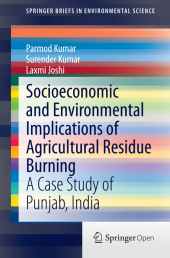 Neuerscheinungen 2014Stand: 2020-02-01 |
Schnellsuche
ISBN/Stichwort/Autor
|
Herderstraße 10
10625 Berlin
Tel.: 030 315 714 16
Fax 030 315 714 14
info@buchspektrum.de |

Laxmi Joshi, Parmod Kumar, Surender Kumar
(Beteiligte)
Socioeconomic and Environmental Implications of Agricultural Residue Burning
A Case Study of Punjab, India
Mitarbeit: Kumar, Parmod; Kumar, Surender; Joshi, Laxmi
2014. xix, 144 S. 5 SW-Abb., 58 Tabellen. 235 mm
Verlag/Jahr: SPRINGER, BERLIN; SPRINGER INDIA 2014
ISBN: 813222146X (813222146X)
Neue ISBN: 978-8132221463 (9788132221463)
Preis und Lieferzeit: Bitte klicken
This book discusses the important issue of the socioeconomic and environmental impacts of agricultural residue burning, common in agricultural practices in many parts of the world. In particular, it focuses on the pollution caused by rice residue burning using primary survey data from Punjab, India. It discusses emerging solutions to agricultural waste burning that are cost-effective in terms of both money and time. The burning of agricultural residue causes severe pollution in land, water and air and contributes to increased ozone levels and climate change in the long term. However, appropriate assessments have not been undertaken so far to demonstrate the relevant impact of agriculture-based pollution, especially residue burning. This book addresses this gap in the literature. Punjab has been used as a case study as it is the chief granary of India, contributing to 27.2 percent of the Indian national produce of rice and 43.8 percent of wheat. It is presumed that the findings from this state will be useful not only for other agricultural areas in India, but across the world. This book, therefore, sensitizes policy makers, researchers and students about the impacts of air pollution caused by agricultural residue burning---a subject not much dealt in the literature---and provides a way forward.
Chapter 1: Problem of Residue Management due to Rice Wheat Crop Rotation in Punjab .- Chapter 2: The Extent and Management of Crop Stubble.- Chapter 3: Valuation of the Health Impact.- Chapter 4: Alternative Uses of Crop Stubble.- Chapter 5: Environment Legislation in India as a Whole and in the State of Punjab.- Chapter 6: Policies for Restricting the Agriculture Residue Burning in Punjab.- Chapter 7: Concluding Remarks and Policy Implications .- References.- Annexure.
"The case of how the Punjab suffered from the environmental crisis and how it is raising its head again trying to achieve sustainable development of agriculture has been narrated in this very useful book, authored by Parmod Kumar, Surender Kumar and Laxmi Joshi. ... The book is systematically structured with seven well informed and well written chapters. ... The authors deserve to be complimented on producing an immensely useful study, which has clarity as well as depth." (Mangesh V. Nadkarni, Journal of Social and Administrative Sciences, JSAS, Vol. 3 (2), June, 2016)


